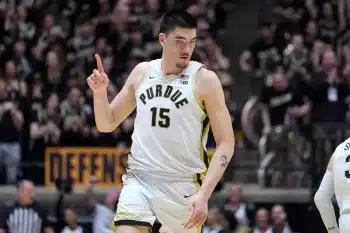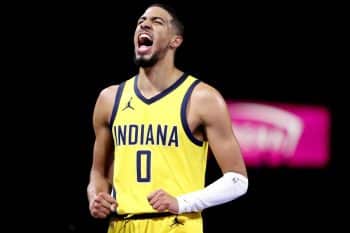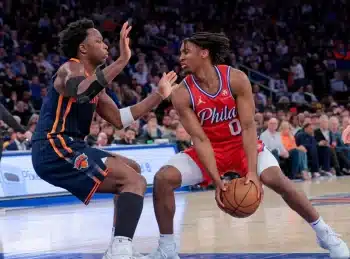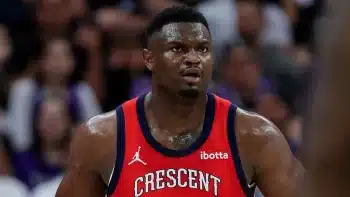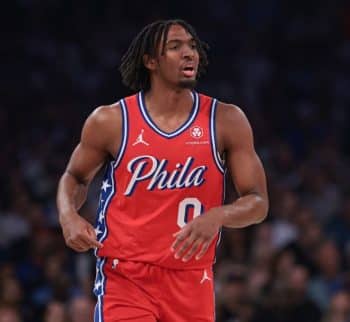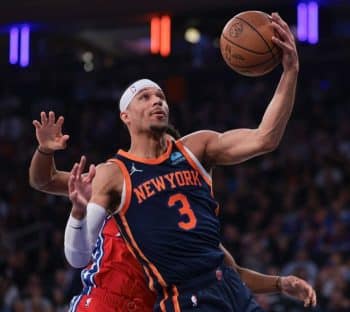NBA
Phoenix Suns 2019-20 NBA Season Preview

The Phoenix Suns have had a bad go of it.
In five years, the Suns have managed just 126 wins, tied with the Knicks for the fewest in the NBA over that span. With the exit of Steve Nash in 2012, the team found themselves in a pit that they have yet to dig themselves out of. There was hope in 2014 – the Suns won 48 games but just narrowly missed the postseason – but they have since spiraled and have yet to recover from it.
Fortunately, for the franchise and their fans, there is a light at the end of the tunnel.
The Suns have wallowed in misery for nearly a decade, their young core having been thrown to the wolves and unable to fend for themselves. But now, after an active offseason, the Suns have decided to bolster their future with several well-traveled veterans.
The rebuild may not be over but, for the first time in a long time, the Suns appear to be on the up. At the very least, they look to be turning a corner, a sight for the sore eyes of any and every NBA fan.
FIVE GUYS THINK
It’ll be a pleasure to see Monty Williams back in the big chair again. Having Devin Booker as his go-to guy should make it rather easy to implement an offense that scores consistently. Deandre Ayton hanging around down low will certainly help the rebounding battle on both ends as well. If there’s a position Phoenix has lacked in recent years, it’s point guard. The organization addressed that this summer with the addition of Ricky Rubio, who can run an offense with his playmaking ability. Defense should take priority first and foremost, a notorious area of struggle for many years. Kelly Oubre Jr. and Mikal Bridges will provide the brunt of the physicality on opposing wings to force turnovers. The Valley Boyz certainly had a swagger about them to close last year as well. Still, they’re amongst a stacked group of four other clubs, so don’t expect more than a fifth-place finish.
5th Place – Pacific Division
– Spencer Davies
The name of the game for the Suns in 2019-20 is development. The team boasts some nice pieces. Devin Booker and Deandre Ayton anchor the team, and we should expect to see continued development from them. They also boast strong role players in Kelly Oubre Jr. and Dario Saric and an accomplished floor general in free agent signee-Ricky Rubio. Unfortunately, the Suns missed an opportunity to add Jarret Culver to their roster when they traded back in the draft to clear cap space. New Head Coach Monty Williams certainly has his work cut out for him given their dismal 2018-19 season. But fortunately for Williams, expectations shouldn’t be too high. The Western Conference will be brutally competitive this season, and Phoenix simply doesn’t have the talent to compete with the elite teams out West.
5th place – Pacific Division
– Drew Maresca
The Suns biggest need heading into the offseason was point guard. They’ve perhaps solved that issue temporarily with the free-agent signing of Ricky Rubio. Rubio has been one of the better playmakers in the league throughout his career, and players like Devin Booker and DeAndre Ayton should benefit from playing alongside him. Speaking of Booker and Ayton, the two quietly put up monster seasons this past year. Booker continued his ascent as one of the league’s top wing scorers, and Ayton had a Rookie of the Year type season, only he didn’t get the same national hype as others did. It is concerning that the Suns are on their fifth head coach in as many years, but they have some quality young pieces in place. It’s time to start showing some real progress. Unfortunately for them, the other teams in the Pacific are that much better than them at this point.
5th Place – Pacific Division
– David Yapkowitz
It’s really hard to say what the Phoenix Suns’ strategy was going into this offseason. A rational approach would have been to focus on adding shooters to surround Devin Booker and Deandre Ayton while adding a point guard to give Booker some time off the ball. The Suns could have addressed the point guard issue by drafting Coby White, who projects to be a very solid lead guard in the future and who would have been on a team-friendly contract for several years. Instead, Phoenix decided to move salary off their books (throwing in two second-round draft picks to do so) in order to sign Ricky Rubio to a three-year, $51 million contract. This move was questionable (to say the least) in a vacuum and is even worse when you consider that Phoenix originally had the sixth overall pick and White went seventh to the Chicago Bulls. Oh, and we haven’t even mentioned that the Suns used the 11th overall pick on Cameron Johnson, who was not projected to go anywhere close to this high on anyone’s draft board. Johnson is a good shooter but his skill set is something that could have been addressed in free agency. There are too many issues to cover in this short section, so I will wrap it up by simply saying there was little rhyme or reason to most of what Phoenix did this offseason.
5th Place – Pacific Division
– Jesse Blancarte
It is hard not to look at the Suns as a perpetual NBA dumpster fire. Ownership continues to make bad decision after bad decision and the results have been the same – disappointment. This year, things at least on the surface look better. Monty Williams brings instant credibility to the revolving door at the head coaching position. James Jones as full-time leader of the franchise has made some good roster additions, which begs the question of whether this might actually be the year things turn in Phoenix? On the surface, maybe. Devin Booker could be an MVP candidate if he continues his progression. Former top pick DeAndre Ayton has the tools to be elite, and the roster seems better suited to winning games more so than at any time in the last five years. If all things play out as they look on paper, the Suns should be significantly better. That doesn’t mean they are playoff contenders, but progress is better than no progress.
5th place – Pacific Division
– Steve Kyler
FROM THE CAP GUY
With Ricky Rubio inked to a three-year, $51 million contract, Devin Booker on a maximum contract and the re-signing of Kelly Oubre at two years, $30 million, the Suns are relatively invested in their developing core. Add in DeAndre Ayton and Mikal Bridges, whose team options for the 2020-21 season are sure to be picked up before November, and the Suns do not project to have enough cap space to sign a max player next summer (perhaps up to $25 million).
Phoenix is still midway through the rebuilding process, perhaps overpaying Rubio will prove worthwhile with a steady point guard. Meanwhile, the team owns all of its own first-round picks and has decent expiring contracts in Tyler Johnson ($19.2 million), Aron Baynes ($5.5 million) and Dario Saric ($3.5 million), should a trade opportunity present itself before the deadline in February. Saric is eligible for an extension prior to the start of the season.
– Eric Pincus
TOP OF THE LIST
Top Offensive Player: Devin Booker
Does this need any explanation?
Devin Booker is one of the best young offensive weapons in the game, certainly the best in Phoenix. Last season, the guard averaged 26.6 points, 4.1 rebounds, 6.8 assists and shot 46.7 percent from the field while he led the team in points and assists.
Booker saw his three-point percentage dip to 32.6 percent, but he has averaged 35.4 percent for his career so some positive regression should be expected.
Booker has been good, great even, thus far into his career. But the 23-year-old should be even better next season. With the best supporting cast of his young career, it would be a surprise if Booker didn’t take a step forward in almost every facet of his game.
Enough said.
Top Defensive Player: Mikal Bridges and Kelly Oubre Jr.
It was hard to decide between Mikal Bridges and Kelly Oubre for this spot, so I didn’t.
Both players are long, twitchy and have the size and speed to defend multiple positions. Both averaged more than a steal per game with the Suns last season (Oubre also played 29 games with the Wizards) while Oubre managed a block per game as well. Both hustle and give everything they have every time they step onto the court.
Case-in-point: the Suns have a pair of spectacular defenders that they can deploy anywhere and everywhere.
The presence of Booker and Deandre Ayton could put a strain on any defense, but the Bridges-Oubre combo should make up for what those two lack on that end of the floor. If nothing else, the two should prove invaluable assets to Phoenix in what has seemed like a never-ending rebuild.
Top Playmaker: Ricky Rubio
It isn’t a stretch to say that Rubio is far and away the Suns’ best point guard since the team traded Eric Bledsoe to the Milwaukee Bucks in 2017.
In fact, while Bledsoe is certainly more athletic, one could argue that Rubio is the best point guard Phoenix has rostered since Goran Dragić before him, or even Nash before him. If nothing else, he’s certainly the point guard they have needed these last few seasons — a primary playmaker that can take on a secondary scoring role.
Alongside Donovan Mitchell – a player, despite their height difference, not too dissimilar to Booker – Rubio averaged 12.1 points, 6.1 assists and shot over 40 percent from the field last season. For his career, the Spaniard has averaged 7.7 assists, which would register as the Suns’ highest mark since Nash posted 10.7 per game in 2012.
To take their next step, Phoenix desperately needed a playmaker alongside Booker, not only to take on some playmaking responsibility but to displace some defensive attention as well. Rubio could do just that for them next season.
Top Clutch Player: Devin Booker
Booker was born with the clutch gene. With the amount of losing the Suns have done in the last few seasons he hasn’t been able to put it to much use, but Booker can clearly turn up the heat when under pressure.
In his four seasons, Booker has hit shot, after shot, after shot (you get the point) to either take the lead or win the game outright for Phoenix. Last season, in the last five minutes of the fourth quarter or overtime and the score within five points, Booker had 35 field goals, good for 16th in the NBA and far and away most on the Suns.
He only managed to shoot 40.2 percent (87 attempts) in those situations, but that fact may be a double-edged sword. Yes, Booker was inconsistent, but the Suns trust him in those moments and should continue to do so.
The team’s newest additions should only serve to draw defensive heat away from Booker, not only in the clutch but throughout the game, so don’t be surprised to see Booker’s efficiency take a jump.
The Unheralded Player: Deandre Ayton
Overshadowed by Rookie of the Year Luka Dončić, Ayton managed to have perhaps the quietest yet dominant season from a rookie in recent memory. In 71 games, the rookie out of Arizona averaged 16.3 points, 10.3 rebounds and shot 58.5 percent on the season.
Ayton is the only rookie ever to average 16, 10 and shoot at least 58 percent from the field.
Ayton also finished second in win shares among rookies, yet, somehow, the center earned a meager 66 points in Rookie of the Year voting and not a single first or second place tally. Both Dončić and the second-place Trae Young posted exceptional rookie seasons, but it would seem as if the NBA just passed Ayton by for some reason or another.
But the Suns (to an extent) know what they have in Ayton (or at least one would hope); there’s a reason they took him with the top selection over Dončić in 2018. If they can push him to be his best, Ayton may not only prove those that have doubted him wrong, but he could become the star Phoenix has long searched for.
Best New Addition: Dario Šarić
The Minnesota Timberwolves sent Šarić to Phoenix when they moved up from 11 to six in the 2019 NBA Draft. Šarić showed promise in his first two seasons with the Philadelphia 76ers but, in a lesser role, took a step back in Minnesota.
Now, the Suns have the opportunity to capitalize on the Croatian forward.
In just 25 minutes split over 81 games in Philadelphia and Minnesota, Šarić averaged just 10.6 points and 5.6 rebounds. He also saw a dip in his field goal percentage and three-point percentage. But there is plenty of talent there; Šarić averaged 14.6 points, 6.7 rebounds and 2.6 assists in the season prior, and had the look for a future star.
Whether a starter or reserve, Šarić is more talented than what he put on display last season. If the Suns can recapture the spark that was his 2017 mini-breakout, they could add a star-caliber piece to their already impressive young core.
– Shane Rhodes
WHO WE LIKE
1. Aron Baynes
The Suns acquired Baynes from the Boston Celtics in a July trade and, while it seemed questionable at the time, there is some logic in the acquisition of a 32-year-old backup.
Baynes, along with some of the other new Suns, should provide a capable, steady veteran to man the second unit. In a similar vein, he should also prove a strong locker room presence for a young team that is going to need a leader.
Likewise, Baynes is a stout defender – during his short time in Boston, he was a key cog in one of the league’s best defenses – and he should prove a competent mentor on that side of the ball for the second-year Ayton.
2. Ricky Rubio
Another veteran addition, Rubio wasn’t the sexiest pickup. But, he could prove vital in the Suns’ quest to return to relevancy in the Western Conference.
He isn’t going to lead the team in scoring, nor will he dominate the ball. But Rubio should vastly improve the flow of the offense without taking too much away from Booker.
But, and perhaps most importantly, Rubio has been there before; maybe not to the extent of the Suns in recent years, but he wallowed in losses with the Timberwolves. In his six years in Minnesota, the team never won more than 40 games, and Rubio can likely empathize with how hard that can be to deal with on a competitive level.
And, after back-to-back postseason appearances with the Utah Jazz, Rubio should now also understand what it can take to reach the top of the Western Conference. Hopefully, he can impart some of that wisdom upon Phoenix next season.
3. Mikal Bridges
On paper, Bridges’ rookie season doesn’t look like much. But, when the Suns allowed him to do so, the wing flashed and he flashed brightly.
We’ve already discussed the fact that Bridges can be an impact defender, but there is room for some major offensive growth in his game. The 23-year-old shot 33.5 percent from three-point range, good for fifth among rookies with at least 200 attempts and fifth among the other Phoenix youngsters.
While his assist totals were low, Bridges also, on occasion, showed excellent court vision and passing ability.
Bridges is talented, and he’s exactly what the best NBA teams are built on– a long, versatile wing that can shoot and play great defense. With a full offseason under his belt and an understanding of the season-long NBA process, it wouldn’t be a shock to see him make a jump in year two.
4. Ty Jerome
Despite his age, Ty Jerome is another piece that could go a long way in the Suns’ hopeful turnaround.
The Virginia product is one of the few players with some winning experience. Fresh off a National Championship win, he is set to join the few already on the Suns’ roster with a championship pedigree.
Jerome should also prove a serviceable reserve in his rookie year; in his last season at Virginia, he averaged 13.6 points, 4.2 rebounds, 5.5 assists 1.5 steals and shot 43.5 percent from the field. Jerome was also a sharpshooter, as he knocked down three-point shots at a 39.9 percent clip.
– Shane Rhodes
Strengths
There is a reason the Suns have sat near the bottom of the NBA for so long. They don’t have many strengths as a team, and that is partly the fault of the personnel, partly the fault of management.
But, Phoenix does have one thing on their side: youth.
The Suns brought in plenty of veteran talent to oversee their operation this season, but their youth is what can drive them into the NBA stratosphere. Ayton, Booker, Bridges, Jerome, Oubre, Saric are, on paper, one of the best young cores in the league and, perhaps more importantly, they are under contract for the foreseeable future.
The Suns may or may not capitalize on the talent they have; players sometimes just don’t “get it,” others can be mismanaged or fall out of favor. But, youth is something that can give Phoenix and their fans hope and, going into next season, it’s one of the few things they have going for them.
– Shane Rhodes
Weaknesses
If it wasn’t already clear, the Suns have been bad, and they’ve been bad for a very long time. A losing culture has been ingrained into the fabric of the franchise.
That type of atmosphere can be hard to overcome, even if a team has all the talent in the world; heavy is the head that wears the crown, but even heavier is the head under the crown’s boot. If Phoenix is ever to find their way out of the NBA’s basement, a monumental effort is going to be required of everyone, players, coaches and executives alike.
– Shane Rhodes
The Burning Question
Can the Suns Finally Take a Step Forward?
The Suns have shown so much promise before, only to trip and land flat on their face. It would be foolish to say they could make a push for the postseason, even more so in the Western Conference, but the roster is clearly on the up; can the franchise push them to the next level? Thus far, they’ve been unable, but with new management in the fold – Jeff Bower, James Jones, Monty Williams, etc. – it could almost be like a fresh start for the Suns next season.
– Shane Rhodes
